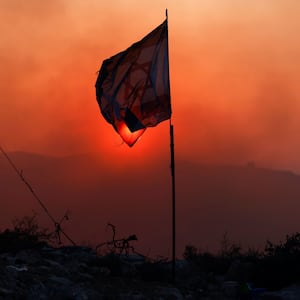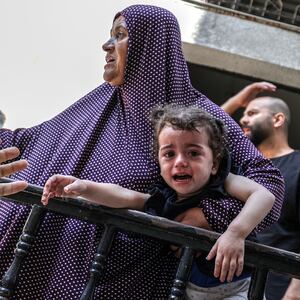“In war, truth is the first casualty.” — Aeschylus, ancient Greek playwright, often described as the father of tragedy.
In the midst of conflict, analysts and policymakers should always be aware that words have meaning, and impact on real life events. At home in America, as well as within Israel/Palestine, we have seen how that happens, with disastrous effect.
The Islamophobic murder of a young boy in Illinois over the weekend only reminds us how our rhetoric about events happening far away can have deleterious consequences at home.
Against the backdrop of Hamas’ brutal attacks on hundreds of mostly Israeli civilians this past weekend, Israel is gearing up for an invasion into Gaza, having begun bombardments that have already led to the killing of thousands of mostly Palestinian civilians. Israeli journalist Lisa Goldman described the environment as, “the country is going into war psychosis. No thought, no plan beyond revenge… So many people will die.”
But Hamas is not on a remote island in the sea; it is in the Gaza Strip, one of the most densely populated areas in the world. The Israeli military advised Palestinians there to “flee” in anticipation of bombardment; of course, they had nowhere to flee to.
As Israeli and international rights groups—as well as groups such as the Norwegian Refugee Council have noted—Gaza is an “open-air prison,” and even UN shelters have been targeted in the Israeli bombardment. But the impression Palestinians could flee provides for disastrous policy prescriptions—for example, expressing full support for Israeli bombardments, under the understanding Palestinians would be safe elsewhere.
There’s no shortage of other base rhetoric that supports yet more abuses and infringements of international law.
As Israel’s president put it, “It is an entire nation out there that is responsible (for Saturday’s massacre of Israeli civilians). It's not true this rhetoric about civilians not aware, not involved. It's absolutely not true.”

Palestinians look for their belongings among the rubble of their destroyed houses in Gaza on October 16, 2023.
Mustafa Hassona / GettyThat kind of discourse merely lays down the ground for complete collective punishment of all Palestinians, no matter where they are, but particularly in Gaza—and, thus, a disregard of the line between fighting armed combatants, and safeguarding innocent civilians in one of the most densely populated, and blockaded, areas in the world.
Israeli cabinet ministers like Bezalel Smotrich insist that Palestinians with Israeli citizenship are in Israel “by mistake,” arguing that Israel’s first prime minister blundered by not expelling them in 1948. Israel’s defense minister announced Israel will “eliminate everything” in Gaza.
The rhetoric isn’t just noise, it leads to action—and that is deeply concerning.
It is tempting in Washington and other western capitals to ignore the impact of such rhetoric on policy; but it would be a mistake to provide Israel “carte blanche” to “do your worst.”

An Israeli soldier near Israel’s border with Lebanon, October 16, 2023.
Lisi Niesner / ReutersBritish and American politicians consistently disregard the supremacy of international humanitarian law with regards to the targeting of civilians, and redirect to Israel’s right to defend itself, so Palestinian civilians are no longer really civilians—and inevitably, dehumanized.
Early on Oct. 13, Israeli forces informed the United Nations that Palestinians in the northern Gaza Strip should “relocate” some 1.1 million people—to the south of the territory, in the space of 24 hours. As the United Nations said in response, it is “impossible for such a movement to take place without devastating humanitarian consequences.”
But to make that kind of policy possible, it is not simply in Israel that we hear dangerous discourse; it is much closer to home, in the U.S. and the U.K., and there are consequences to that rhetoric.
We are fortunate that in the U.K. and the U.S., anti-semitism has been more or less stamped out of acceptable discourse from our nation’s politicians and opinion. But anti-Arab bigotry and Islamophobia does not attract the same kind of vehement opposition.
A British journalist and newspaper editor, James Simons, declared “much of Muslim culture” is in the grips of a “death cult,” confirming that, as a former senior Portuguese politician wrote, Islamophobia has become, “morally mandatory” for much of the European elite. Indeed, following his outrageous comments, the journalist was invited onto the BBC’s Question Time.

Palestinians wave the national flag during a march in the West Bank city in Ramallah on October 16, 2023.
Jaafar Ashtiyeh / GettyAmerican politicians like Sen. Lindsey Graham (R-SC) declared, “this is a religious war… level the place (Gaza),” while Florida Gov. Ron DeSantis (a presidential frontrunner) unilaterally labeled all Gazans as “anti-semitic,” which he argued should bar them from being admitted as refugees into the U.S.
It is hard to disassociate that kind of rhetoric with the murder of a Palestinian boy in Illinois this past weekend, where police said his family’s landlord murdered him in relation to the ongoing crisis in Israel/Palestine. The six-year-old child was stabbed 26 times.
Writer David Klion asks, “have we learned nothing,” from how rhetoric led to the tragic, ill-advised wars, torture, and other violations of human rights in the aftermath of 9/11, it’s a poignant question.
There is a clear connection between the rhetoric we see, and the policies we uphold. International humanitarian law applies to human beings; when such human beings are dehumanized, as Israeli and Palestinian civilians have been, it is a precursor to their being treated inhumanely. Collective punishment of the Palestinians in Gaza is thus seen as legitimate, including the cutting off of electricity, food, and fuel into Gaza.
“When you tell yourself the lie, it leads to the wrong policy,” as former advisor to Israeli prime minister Ehud Barak, Daniel Levy, put it.
If we hope to have peace and security in this region, and at home, it’s imperative for policy makers to exhort and demand an adherence to international law, and to disavow any rhetoric that would lay down the grounds for its rejection.
President Joe Biden condemned the Islamophobic attack that led to the death of the Palestinian child earlier this weekend, as he should have: but he, and all of us, have to go after the background music that gives fuel to that kind of atrocity, and worse.









